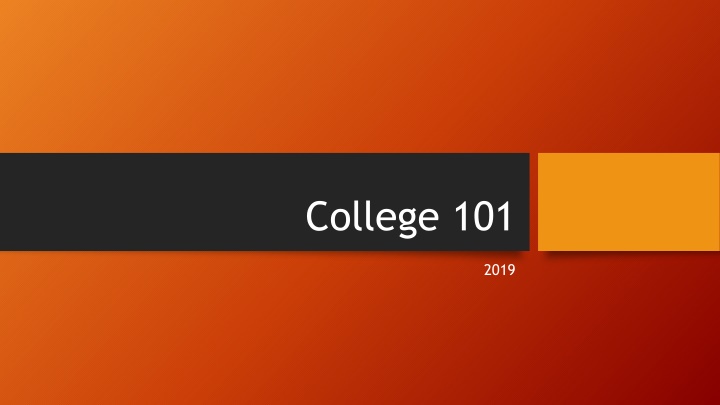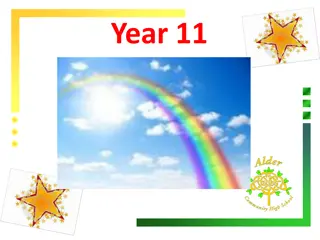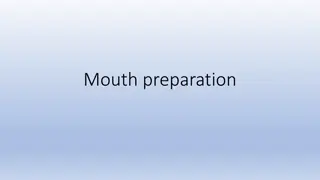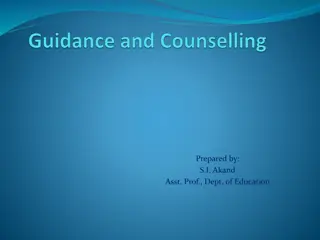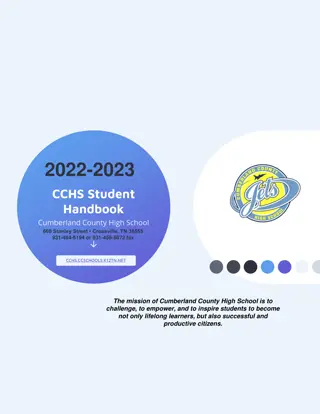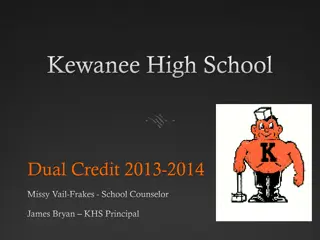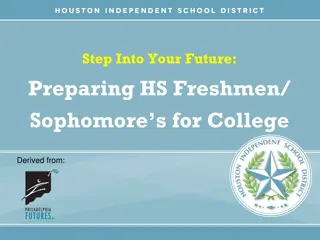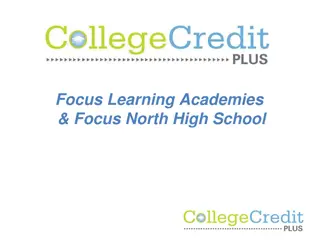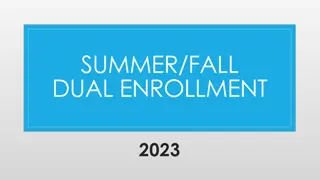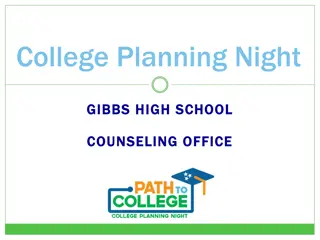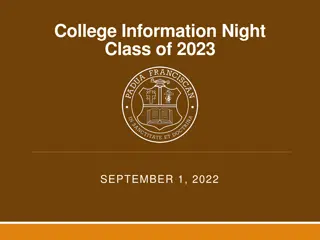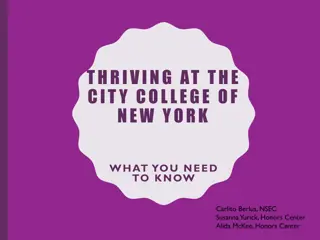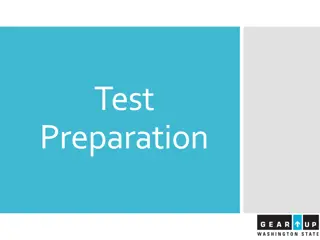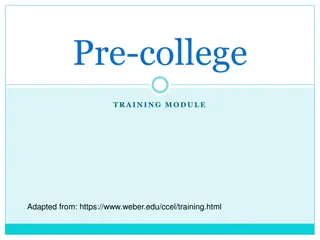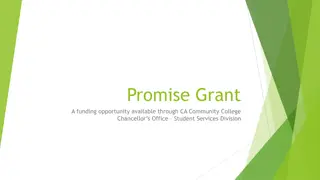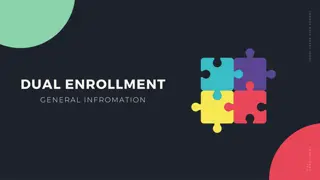Navigating High School and College Preparation: Essential Guidance
Explore the crucial aspects of preparing for high school graduation and college admission, including selecting courses, career exploration, choosing the right college, understanding costs, and financing options. Discover the core classes required by Arizona Public University and the importance of electives and AP/Honors courses. Learn about career exploration tools like NAVIANCE and ASVAB to help students understand themselves and potential career paths.
Download Presentation

Please find below an Image/Link to download the presentation.
The content on the website is provided AS IS for your information and personal use only. It may not be sold, licensed, or shared on other websites without obtaining consent from the author.If you encounter any issues during the download, it is possible that the publisher has removed the file from their server.
You are allowed to download the files provided on this website for personal or commercial use, subject to the condition that they are used lawfully. All files are the property of their respective owners.
The content on the website is provided AS IS for your information and personal use only. It may not be sold, licensed, or shared on other websites without obtaining consent from the author.
E N D
Presentation Transcript
College 101 2019
Agenda High School Courses needed for graduation and college admission Career Exploration Personal interests and career pathways College Club College Entrance Exams Purpose and score relevance; preparation College Selection Choosing the right college Cost Cost of attendance Financing Paying for college
Getting to High School Graduation 2020 English Math (Alg I, Geometry, Alg 2, & higher level) Science Social Science Foreign Language (2 for colleges/universities) Fine Art or CTE Personal Development Electives Total Credits 4 4 3 3 1 2 1 6 24
Arizona Public University Core Classes English Math (Alg I, Geometry, Alg 2, & higher level) Lab Science Social Science Foreign Language (same language) Fine Art or CTE Total Core classes 4 4 3 2 2 1 16
Electives and AP/Honors in High School Students choose from a wide variety of electives. Choose classes that are most relevant to your career path and personal development. Take AP/Honors classes when you able and success is likely. These will help prepare you for college-level work. AP/Honors classes improve your weighted GPA which tells colleges about the rigor of the courses taken. Receiving a C or worse in an AP/Honors class is not beneficial.
Career Exploration Two ways that DEHS helps students with understanding themselves and careers that would be good fits are: NAVIANCE ASVAB
NAVIANCE Each student has a portfolio of assessments they have taken. Several of the assessments have suggested careers to explore based on what they like to do and what they are good at doing. Students are encouraged to research careers and note their favorites. Their portfolio is also a place to track their college applications, scholarships, accomplishments, resumes and more. Parents should review with their students. Parental access is also available through your counselor or Mr. Cravens.
ASVAB Armed Services Vocational Aptitude Battery Military Entrance Exam Outstanding Career Exploration Tool
Career Fair and Community Career Classic DEHS brings in Community Business Leaders to discuss their field of expertise in the Community Career Classic sponsored by Mrs. Koblinski, Parent Involvement Specialist. The Career Fair also brings in many vocational training organizations for an annual event in the courtyard during Power Hour. Hearing from these individuals helps our students begin considering the importance of career exploration while in high school.
College Club / Be A Leader Foundation One of the clubs on campus is the College Club which has an affiliation with the non-profit Be A Leader foundation. Students of all grade levels who want to explore colleges, scholarships, and everything related to the college experience may attend. College representatives are often invited to present. We have had George Mason University, the University of Oregon, Hawaii Pacific University, the University of Alabama and many more along with most Arizona colleges and universities. The College Club meets on Tuesdays during the 1sthalf of Power Hour in the College and Career Center.
College Entrance Exams There are two College Entrance Exams, the ACT and the SAT. Almost every college accepts scores from either without preference. Many colleges require a college entrance exam for admissions. Some colleges and most community colleges do not. College Scholarships often use College Entrance Exam scores. DEHS utilizes the ACT. A free ACT test ($52) is given to all Juniors in April.
College Entrance Exams The top score on an ACT test is 36. The top score on an SAT is 1600. While each college sets different standards, an ACT score of 19-22 is generally considered the minimum college entrance score. Often, the higher the score, the greater the scholarship offered. Check the ASU Scholarship Estimator https://scholarships.asu.edu/estimator Elite colleges may expect ACT scores in the 30s.
Test Preparation Preparing for a College Entrance Exam is imperative. We provide a Pre-ACT to sophomores in the spring. We provide tutoring sessions to the Juniors prior to their April test. The ACT website has on-line courses and books available. Most students should consider an additional test or two. A waiver covering the cost of the ACT is available for students with financial need. See Mr. Cravens.
College Selection Finding the right fit college is extremely important. The factors to be considered are many and varied. Here are a few: Location Cost Programs offered Religious affiliation Social environment Diversity Housing Personal safety
College Selection Important steps to take: Keep a file of College Materials, correspondence, etc. Attend College Fairs DEHS September 25, National College Fair October 20. Arizona colleges visit DEHS regularly. Out-of-state colleges also visit. Check Naviance or DEHS website for upcoming schedule. Visit college campuses on your own or school-sponsored field trips. Use website profiles such as Super Match (Naviance) or Big Future (College Board.org). Many colleges have virtual tours on their websites. Don t rule out Community College for the first two years.
College Admissions Requirements College Admissions Requirements vary greatly. Check college websites for specifics. ASU, the UofA and NAU will accept students with a 3.0 unweighted GPA in 16 core classes or a 22 ACT score (ASU). Consideration may be given if GPA is 2.5-3.0. Things such as leadership, community service, and overcoming personal hardships may be considered. Grand Canyon University looks for a 3.0 unweighted GPA in all classes or a 19 ACT score. College Application Event, Friday, Sept. 27. Sign up in C&C Center
College Admissions Requirements Elite College standards are much higher. In some cases, the expectation in certain areas (i.e. engineering) can be higher than other areas. Class rank may play a role in admissions. Letters of recommendation and/or personal statements/essays may be required. Prepare early. Official transcripts available at https://www.parchment.com/ Portfolios are often required for arts programs.
College Admissions Requirements Most colleges have their own applications but others utilize a Common Application universally accepted. Go to the Common Application website for details: https://www.commonapp.org/ Community Colleges generally do not have a GPA or ACT requirement. However, some students are asked to take an Accuplacer Placement Test to determine if they are best-suited for college-level or remedial classes. Military ROTC requirements are similar to college entrance requirements. Military academy standards are closer to elite college standards.
Cost of Attendance College is Expensive! Generally, the cost of tuition, room, board, books, fees and other related costs are $27,000-$28,000 per year at ASU, NAU, UofA, or GCU. Community College costs are closer to $6,000/year without room and board. Out-of-state and private colleges are even more expensive. Out-of-state tuition alone can run $25,000/year. Then add room and board. Some regional colleges provide discounted tuition rates to Arizona students. Check with each college representative. Most colleges have a Cost of Attendance worksheet on their websites.
Paying for College There are several ways to pay for college: Savings Grants Scholarships Work-study programs Loans
Grants Grants are need-based funds that are not repaid. Private grants are available from your college or outside sources. The majority of grant money comes from the Federal Government called the Pell Grant. The top award is $6,095 and supplemental grants of $1,000-$2,000 are sometimes awarded. You apply for a Pell Grant when you complete a FAFSA and request results sent to the colleges being considered.
FAFSA The FREE Application for Federal Student Aid Completed on or after October 1 each year the student is in college. Completed by both the student and parent. Detailed FAFSA information is provided to all Seniors in their government classes with workshops available to parents (Oct. 3, 6:00-8:00 PM, Millennium H.S.)
Scholarships Scholarships are generally academic-based although some require leadership or community service activity. Most Scholarships are provided by the college or university attending. Amounts vary. Check the ASU Scholarship Estimator https://scholarships.asu.edu/estimator Many colleges have tables or charts that outline specific scholarship amounts. Check with each school. Scholarships may or may not be renewable each year. Academic requirements generally exist.
Scholarships - Examples NAU has a Lumberjack Scholarship full tuition ($11,000+). Grade Point Average of 3.50 in core classes with no C s . ASU has Obama Scholarship mostly need-based (<$42,400/year income); 3.0 in core classes or 22 ACT. Nearly 100% of college costs covered. University of Arizona has Wildcat Excellence ($3,000-$15,000) based on a scale that includes GPA and ACT. Grand Canyon University offers $4,000-$10,000 based on weighted GPA or ACT score beginning at 3.0 GPA, 19 ACT.
Scholarships Many colleges offer additional scholarships for certain areas of study, i.e. Teaching. Check with each college. All colleges have excellent financial aid departments who help students locate additional funding sources including scholarships. Review opportunities with the military and National Guard. There are scholarship opportunities for both active duty and reserves.
Scholarship Searches There are lots of additional places to look for scholarships. DEHS provides a list of websites with thousands of scholarships. Community scholarships are often awarded. These opportunities are listed on Naviance and discussed during College Club meetings. The Phoenix Public Library has an excellent list of scholarships in their College Depot website: https://www.phoenixpubliclibrary.org/collegedepot/Pages/Scholarships.aspx
Work Study Most colleges offer Work Study programs to their students. These are campus jobs that vary in nature bookstore, tutoring, tour guides, etc.. When completing a FAFSA application, check the Work Study box. Once enrolled, students will have a choice of jobs to apply for. Research has found that students with Work Study jobs often perform better than students who do not. Work schedules are flexible based on school and holiday schedules.
Loans Sometimes, loans are necessary to pay for college. Be careful not to take out more in loans than the likely career is able to pay for. Government loans are the best loans available. Information on these loans is provided after you ve completed the FAFSA. Student loans are not due until the student has left college. Loans of $5,500 per year are often available directly to the student without credit check. Parent loans are also available from the government. These are often the lowest available interest rates. Credit check required. Private loans are also available from financial institutions.
Conclusion QUESTIONS?
College 101 Thanks for attending!
